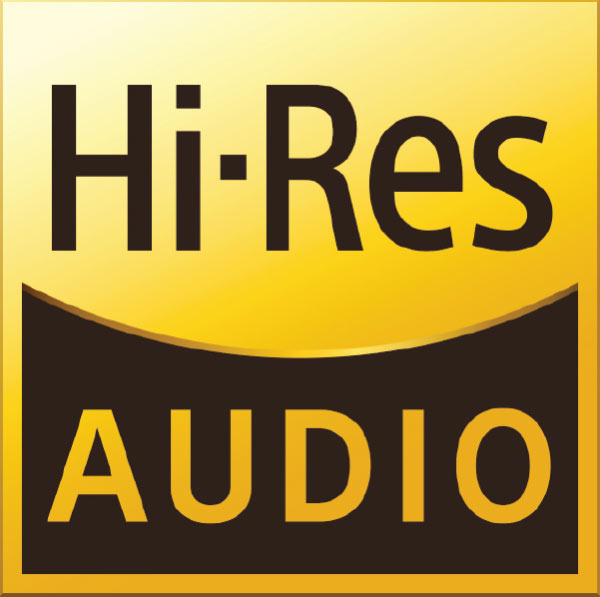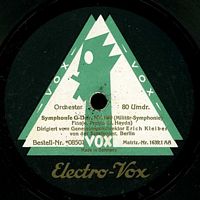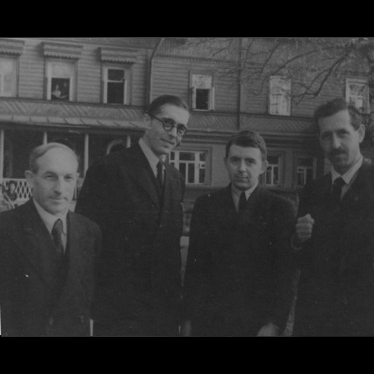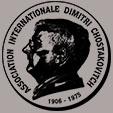Étiquette : BPO
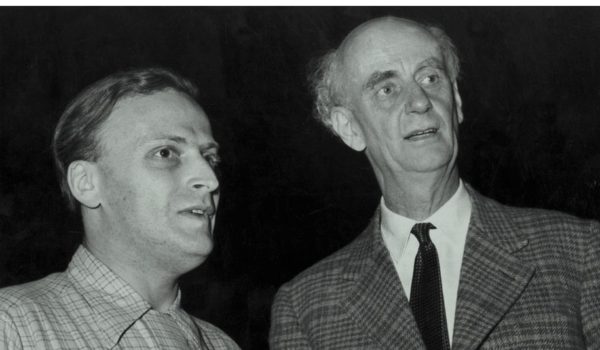
Yehudi Menuhin & Wilhelm Furtwängler
Mendelssohn: Concerto Op.64 Berliner Philharmoniker (BPO)
Berlin Jesus-Christus Kirche – 25 & 26 Mai 1952
Eng: Robert Beckett
______
Beethoven: Romances Op.40 & 50 Philharmonia Orchestra
London Kingsway Hall – 9 April 1953
Prod: Lawrence Collingwood & David Bicknell – Eng: Douglas Larter
Source: Bande/Tape 19 cm/s / 7.5 ips HTA 2
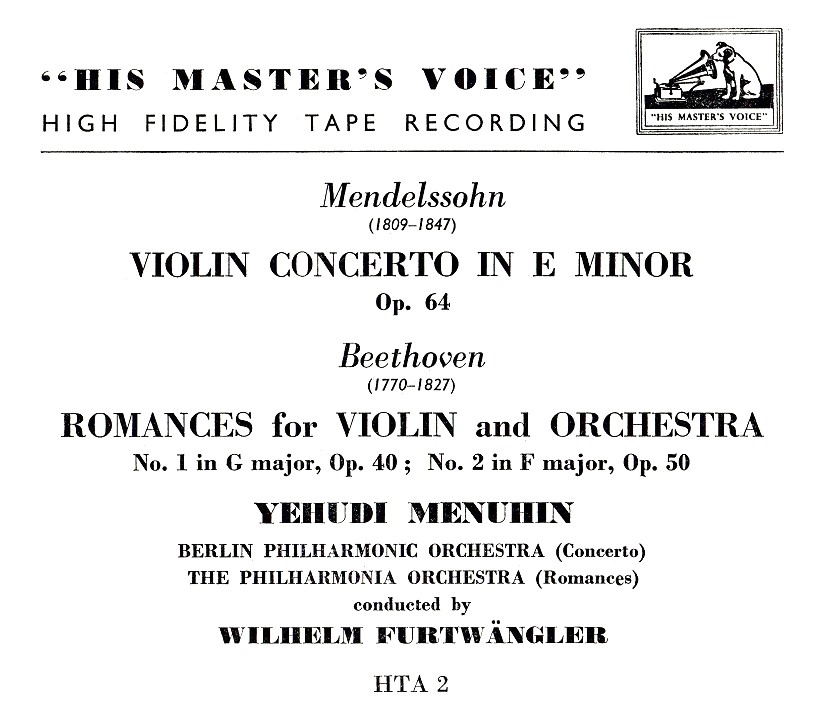
Menuhin et Furtwängler ont joué pour la première fois ensemble le Concerto Op.64 de Mendelssohn le 29 septembre 1949 au Royal Albert Hall de Londres avec les Wiener Philharmoniker.
Avec le Berliner Philharmoniker (Berliner Philharmonisches Orchester) de retour d’une tournée qui s’est déroulée entre le 24 avril et le 19 mai 1952, ils ont joué ce Concerto au Titania Palast de Berlin le 24 mai avant de l’enregistrer les 25 et 26 à la Jesus-Christus Kirche, salle utilisée habituellement par la Deutsche Grammophon et la RIAS.
C’était la première fois qu’après la guerre EMI enregistrait Furtwängler à Berlin. Il y eut ensuite un autre enregistrement berlinois, à savoir l’Ouverture de ‘Leonore II’ de Beethoven les 4 et 5 avril 1954 à la Musikhochschule, avec cette fois une équipe d’enregistrement allemande (Prod: Fritz Ganss: Eng: Horst Lindner), peut-être un test annonciateur d’un changement de politique discographique qui n’a malheureusement pas pu se concrétiser en raison du décès du chef d’orchestre. On peut penser en effet qu’EMI aurait souhaité enregistrer l’année suivante avec Furtwängler et le BPO les Kindertotenlieder de Mahler avec Fischer-Dieskau (l’œuvre a été jouée à Berlin en décembre 1953, et un enregistrement à Londres en mars 1954 avec le Philharmonia a été annulé) ainsi que le Deutsches Requiem de Brahms avec Grümmer et Fischer-Dieskau, deux projets qui ont été confiés in fine à la direction de Rudolf Kempe.
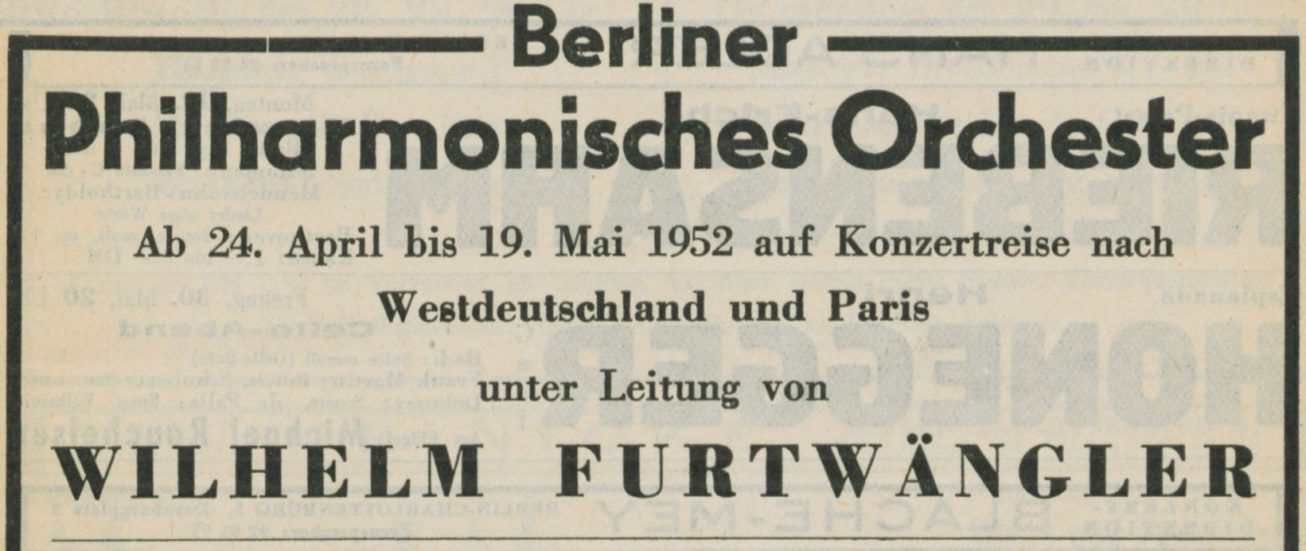
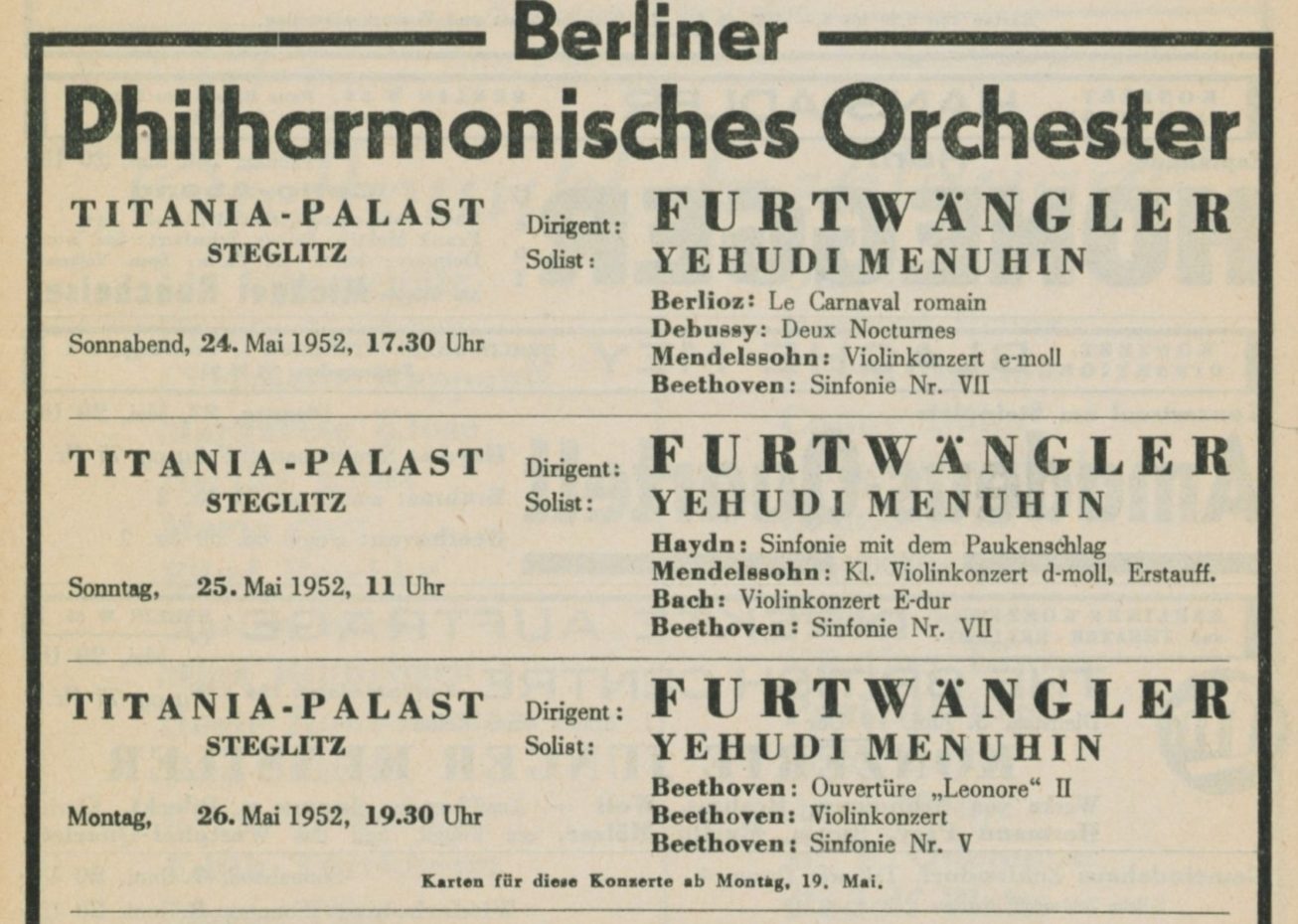
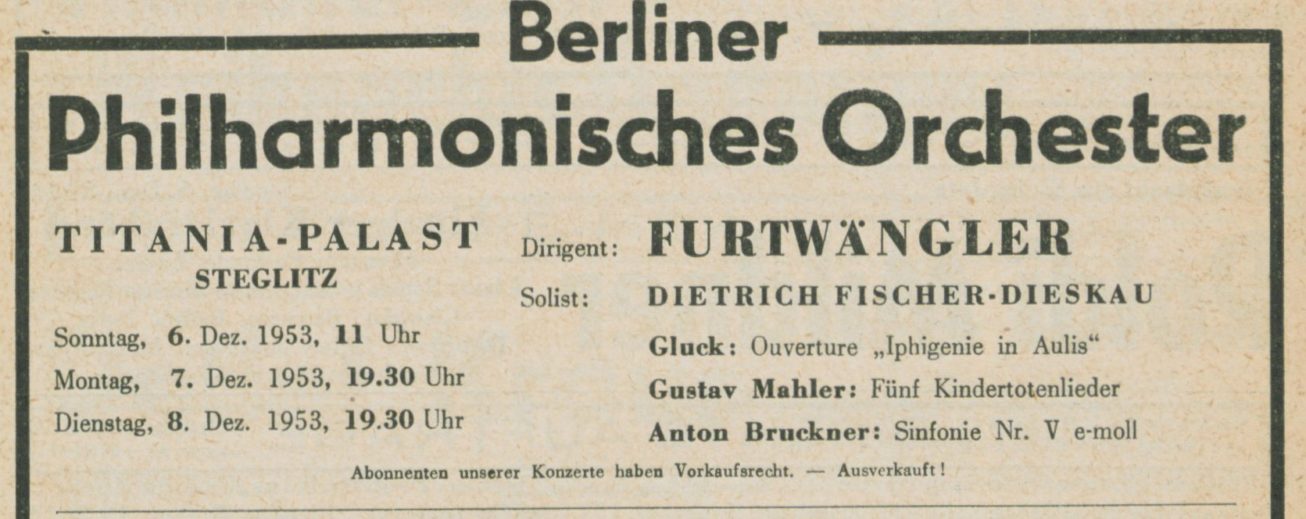
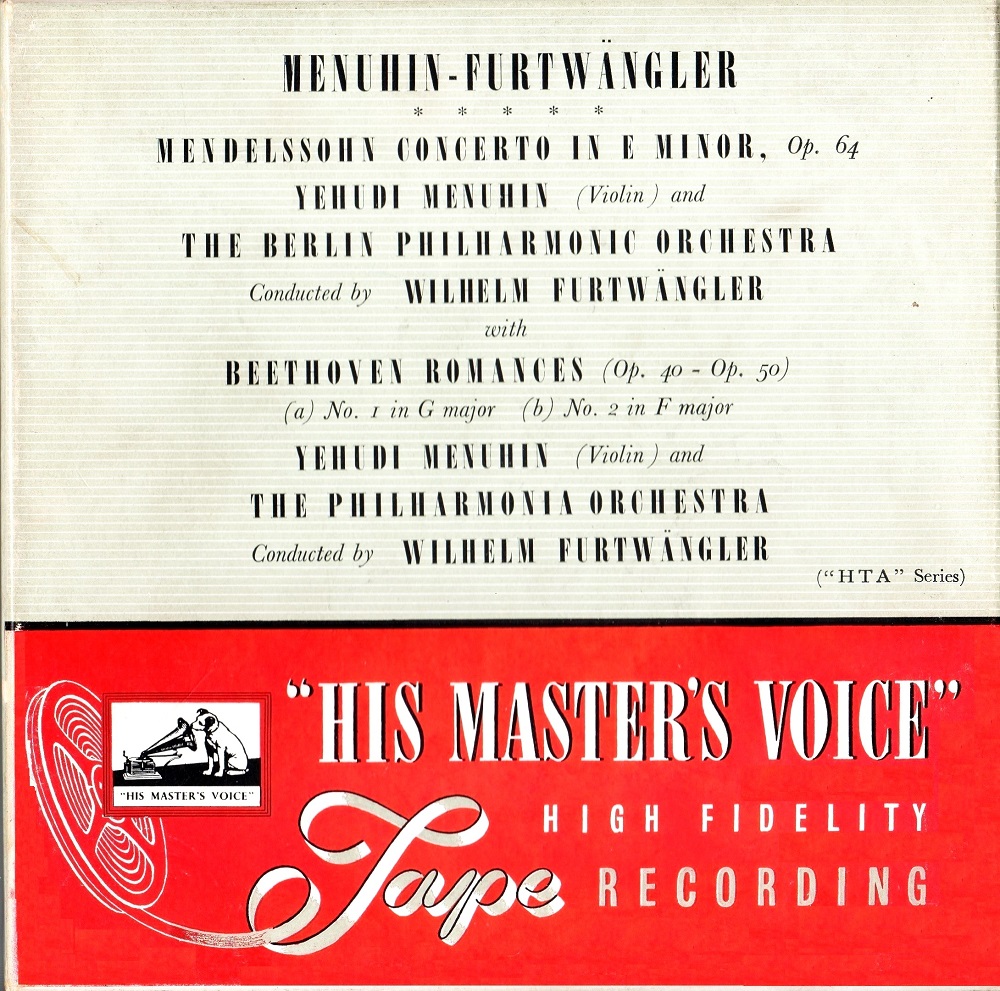
Menuhin and Furtwängler performed Mendelssohn’s Concerto Op.64 together for the first time on 29 September 1949 at London’s Royal Albert Hall with the Wiener Philharmoniker.
With the Berliner Philharmoniker (Berliner Philharmonisches Orchester) on their return from a tour that lasted from 24 April to 19 May 1952, they played this Concerto at the Titania Palast in Berlin on 24 May before recording it on 25 and 26 May at the Jesus-Christus Kirche, a venue known as being used by Deutsche Grammophon and RIAS.
It was the first time after the war that EMI recorded Furtwängler in Berlin. There was later another recording in Berlin, Beethoven’s Overture ‘Leonore II’ on April 4 and 5 1954 at the Musikhochschule, this time with a German recording team (Prod: Fritz Ganss: Eng: Horst Lindner), maybe a test which heralded a change in recording policy that unfortunately could not materialise due to the conductor’s death. Indeed, one might think that EMI would have liked to record the following year with Furtwängler and the BPO Mahler’s Kindertotenlieder with Fischer-Dieskau (the work was performed in Berlin in December 1953, and a recording in London in March 1954 with the Philharmonia had been cancelled) as well as Brahms’ Deutsches Requiem with Grümmer and Fischer-Dieskau, two projects that were ultimately entrusted to Rudolf Kempe.
Les liens de téléchargement sont dans le premier commentaire. The download links are in the first comment
Warner vient d’annoncer la publication le 24 septembre prochain d’un coffret de 55 CD consacré à la totalité des enregistrements réalisés par Wilhelm Furtwängler, non seulement pour le groupe EMI, mais également sous les labels Polydor, Telefunken, Decca et DGG.
La composition des 55 disques de cette compilation est donnée ici:
https://hdarchivesconcerts.fr/coffret-warner-55-cd-the-complete-wilhelm-furtwangler-on-record/
Une première analyse sur la base des renseignements publiés par Warner est publiée ici:
Au sujet du Coffret « The Complete Wilhelm Furtwängler on Record »
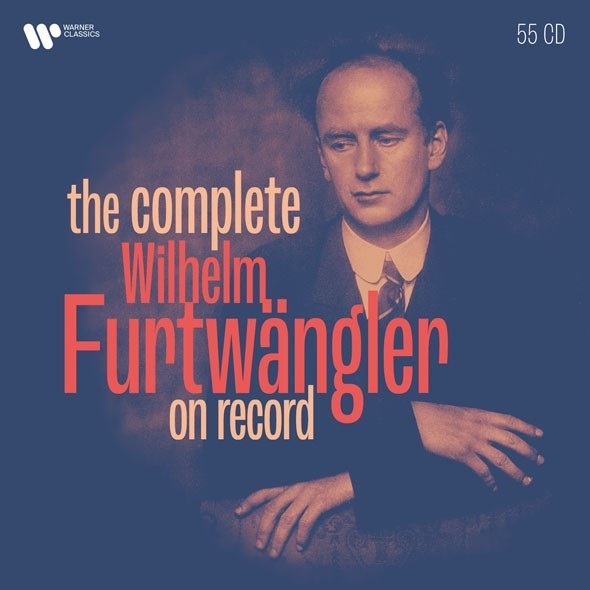
Warner has just announced the publication on September 24 of a 55 CD Album dedicated to all the recordings made by Wilhelm Furtwängler not only for the EMI group, but also for the other labels Polydor, Telefunken, Decca and DGG.
The track listing of the 55 CDs is presented here:
https://hdarchivesconcerts.fr/coffret-warner-55-cd-the-complete-wilhelm-furtwangler-on-record/
A primary analysis based on the documentation published by Warner is here:
Comments on « The Complete Wilhelm Furtwängler on Record »
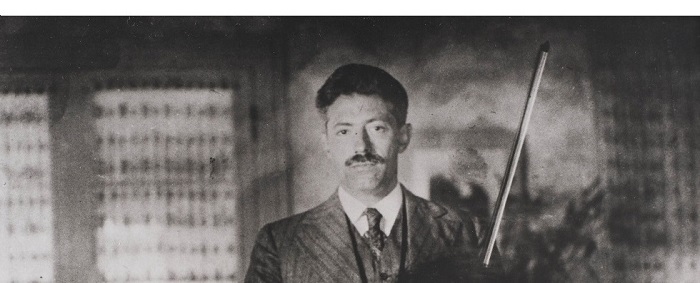
1-3 Concerto pour violon et orchestre Op.64 – Staatskapelle Berlin 9&10 décembre 1926
4 Die Hebriden, Ouvertüre, Opus 26 – Berliner Philharmoniker (BPO) – 5 avril 1932
___________
London Symphony Orchestra (LSO):
5 Meeresstille und glückliche Fahrt, Opus 27 – Kingsway Hall 28 octobre 1931
6 Symphonie n°4, Opus 90 : IV. Saltarello: Presto – Kingsway Hall 27 octobre 1931
7 Lieder ohne Worte, Opus 62 n°6 & Opus 67 n°4 – Queen’s Hall 29 octobre 1931
___________
1-5 33t. Melodiya; 6-7 33t. Past Masters
Le violoniste Fritz Kreisler (1875-1962) a gravé beaucoup de disques, mais ses enregistrements les plus importants ont été réalisés dans les années vingt avec les Concerti de Beethoven, Brahms et Mendelssohn sous la direction de Leo Blech, et des Sonates de Schubert, Beethoven et Grieg avec Sergeï Rachmaninov au piano.
Le premier en date de ces enregistrements est le Concerto de Mendelssohn capté les 9 et 10 décembre 1926 à la Singakademie de Berlin avec la Staaskapelle de Berlin (l’Orchestre du Staatsoper). La qualité de la prise de son est vraiment étonnante, surtout en ce qui concerne le violon, tant du point de vue du timbre que de l’ampleur sonore. A l’époque, il jouait sur un Stradivarius de 1733 qui a été son instrument de 1908 à 1934, date à laquelle il fut acheté par Bronislaw Huberman, et il le remplaça par un autre « Strad », le « Lord Amherst of Hackney » de 1734 qu’il conservera jusqu’en 1946.
Dans le Concerto, Kreisler bénéficie du soutien orchestral apporté par Leo Blech que les autres enregistrements montrent comme un mendelssohnien hors pair. Dans les deux Ouvertures, il arrive à rendre aussi bien la légèreté et la fluidité du discours que sa tension dramatique. Le Final de la Symphonie « Italienne » est enfin un vrai Saltarello, joyeux et dansant d’un bout à l’autre. Quel dommage que l’on n’ait pas les trois autres mouvements!
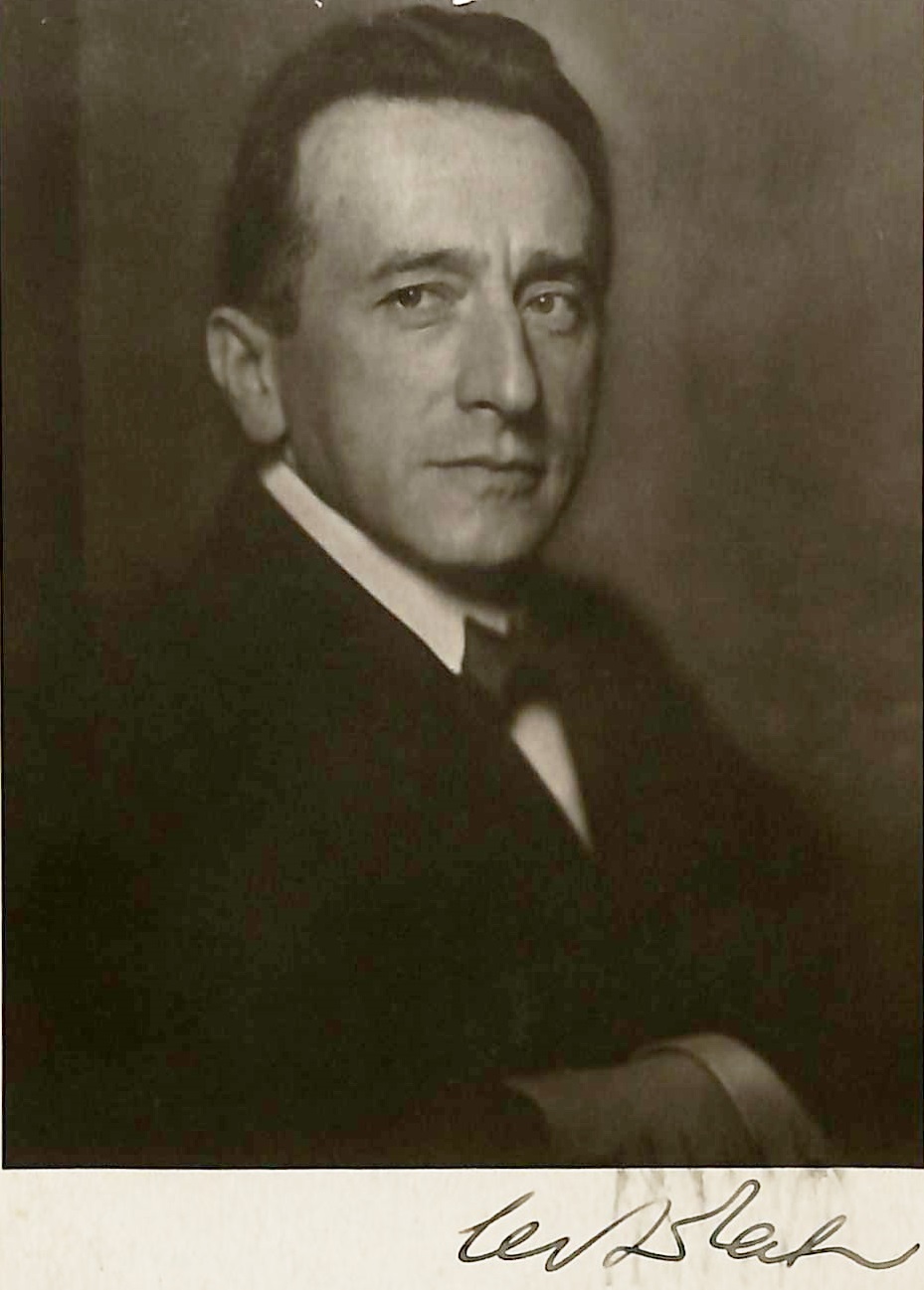
Violonist Fritz Kreisler (1875-1962) has cut many discs, but his most important recordings have been made during the 20s with Concerti by Beethoven, Brahms and Mendelssohn conducted by Leo Blech, and Sonatas by Schubert, Beethoven and Grieg with Sergeï Rachmaninov at the piano.
The earliest of these recordings is Mendelssohn’s Concerto recorded on 9 and 10 December 1926 at the Singakademie of Berlin with the Staaskapelle Berlin (the Orchestra of the Staatsoper). The recorded sound is truly astonishing, especially for the violin, for both timbre and volume. He was then playing on a 1733 Stradivarius which was his instrument from 1908 to 1934, when it was bought by Bronislaw Huberman, and he replaced it by another « Strad », the 1934 « Lord Amherst of Hackney » he kept until 1946.
In the Concerto, Kreisler benefits from the orchestral support brought by Leo Blech whom the other recordings display as an outstanding Mendelssohn conductor. In both Overtures, he succeeds in rendering the lightness and the fluidity of the musical speech as well as its dramatic tension. The Final of the « Italian » Symphony is for one a true Saltarello, playful and dancing from beginning to end. What a pity he did not record the other three movements!
Les liens de téléchargement sont dans le premier commentaire. The download links are in the first comment.
